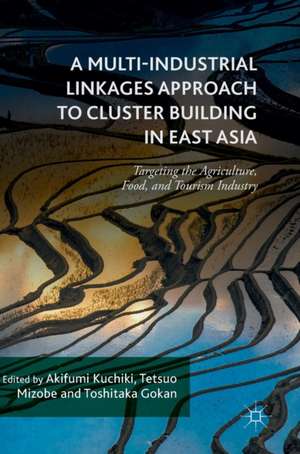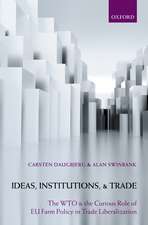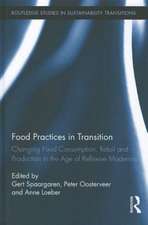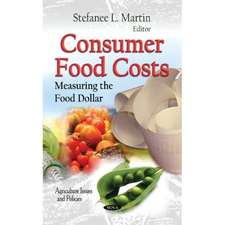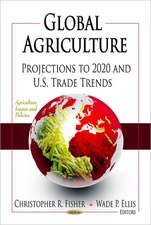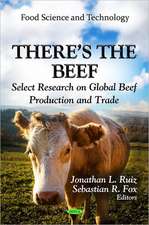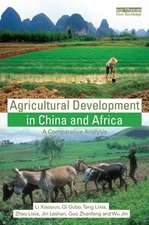A Multi-Industrial Linkages Approach to Cluster Building in East Asia: Targeting the Agriculture, Food, and Tourism Industry
Editat de Akifumi Kuchiki, Tetsuo Mizobe, Toshitaka Gokanen Limba Engleză Hardback – 3 feb 2017
Preț: 783.98 lei
Preț vechi: 956.08 lei
-18% Nou
Puncte Express: 1176
Preț estimativ în valută:
150.03€ • 156.06$ • 123.86£
150.03€ • 156.06$ • 123.86£
Carte tipărită la comandă
Livrare economică 15-29 aprilie
Preluare comenzi: 021 569.72.76
Specificații
ISBN-13: 9781137571274
ISBN-10: 1137571276
Pagini: 310
Ilustrații: XXV, 295 p. 65 illus., 24 illus. in color.
Dimensiuni: 148 x 210 x 24 mm
Greutate: 0.5 kg
Ediția:1st ed. 2017
Editura: Palgrave Macmillan UK
Colecția Palgrave Macmillan
Locul publicării:London, United Kingdom
ISBN-10: 1137571276
Pagini: 310
Ilustrații: XXV, 295 p. 65 illus., 24 illus. in color.
Dimensiuni: 148 x 210 x 24 mm
Greutate: 0.5 kg
Ediția:1st ed. 2017
Editura: Palgrave Macmillan UK
Colecția Palgrave Macmillan
Locul publicării:London, United Kingdom
Cuprins
1. Basic Concept and Summary; Akifumi Kuchiki and Tetsuo Mizobe.- 2. The Agriculture, Food, and Tourism Industry Cluster in China; Ke Ding.- 3. The Agriculture, Food, and Tourism Industry Cluster in the Republic of Korea; Youkyung Lee.- 4. The Agriculture, Food, and Tourism Industry Cluster in Japan: Case Studies of the Tourism Industry Clustering in Okinawa and Aichi; Teppei Yamashita.- 5. The Agriculture, Food, and Tourism Industry Cluster in Japan Okinawa: The Key Role of an Airport in Clustering; Koh Kikuchi.- 6. Tourism Development in Cambodia: Analysis of Factors in the Creation of Local Specialties; Teppei Yamashita.- 7. Collocation of Industries in Agri-Food-Tourism in Vietnam; Toshitaka Gokan.- 8. An Application of the Levels of Organization in Biology to Process Formation in an Industrial Cluster: The Economies of Sequence; Akifumi Kuchiki and Tetsuo Mizobe.- 9. Railway-led Formation of the Agri-Food-Tourism Industry Cluster: Escaping the Middle Income Trap; Akifumi Kuchiki, Toshitaka Gokan, and Toyojiro Maruya.- 10. Quantitative Analyses of the Economies of Sequence: The Impact of New Airport Construction on Tourism Industry Growth: A Case Study of Hong Kong and Singapore; Zhixin Chen, Yuki Yano, Tetsuya Nakamura and Akifumi Kuchiki.- 11. An Application of the Flowchart Approach to the Agro-food Processing Industry Cluster in East Asia: The Case of the Nacala Corridor Region in Mozambique; Akifumi Kuchiki and Tetsuo Mizobe.- 12. A Comparison of the Information Technology Industry Cluster with the Agriculture-Food Cluster from the Perspective of the Economies of Sequence; Akifumi Kuchiki.- 13. An Application of Biology to the Formation of Segments in an Industrial Cluster; Akifumi Kuchiki.
Notă biografică
Akifumi Kuchiki is a professor at the College of Bioresource Sciences, Nihon University, Japan, and was Executive Vice President of the Japan External Trade Organization. He is co-editor of Industrial Clusters in Asia (2005), The Flowchart Approach to Industrial Cluster Policy (2008), From Agglomeration to Innovation (2010), and Industrial Clusters, Upgrading and Innovation in East Asia (2011).
Tetsuo Mizobe is an associate professor at the College of Bioresource Sciences, Nihon University, Japan. He worked in consultancy between 1980 and 2010 on development issues, during which time he became a leader of rural and agricultural development projects.
Toshitaka Gokan is a research fellow at the Institute of Developing Economies, Japan External Trade Organization (IDE-JETRO). His research focuses on the spatial distribution of economic activities such as new economic geography.
Textul de pe ultima copertă
This book proposes measures to promote regional industrial development in East Asia from the perspective of three industries: agriculture, food, and tourism. The authors argue that for regional agriculture to develop, collaboration with the food industry is essential. Further, by linking tourism, economic collaboration between the three industries is strengthened. The first part of the book introduces a basic model for the formation of the agriculture, food, and tourism industry cluster. Contributions from leading academics in agricultural economics then go on to discuss the relevance of this multi-industry cluster in countries such as Japan, the Republic of Korea, and Cambodia, amongst others. The final part sets out new approaches for further development in the cluster through quantitative analyses of the ‘economies of sequence’ concept. Readers will discover that from establishing linkages between different industries and other economic sectors, important positive externalities canbe generated and these processes can be triggered on the local or cluster level.
Caracteristici
Offers perspectives on the economic linkages between East Asian agriculture, food, and tourism industries Includes contributions from leading scholars in agricultural economics Discusses multi-industry clusters in a variety of East Asian countries
